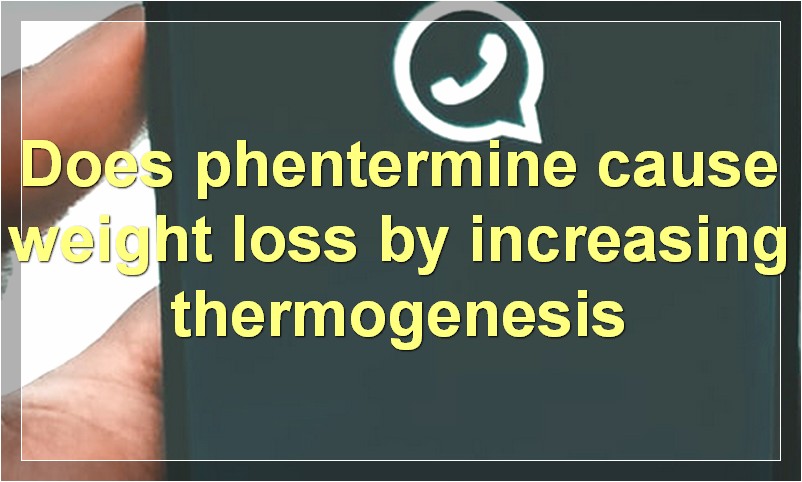If you’re looking to lose weight, you may have heard of phentermine. But how does this popular weight loss drug work?
What are the mechanisms by which phentermine works in the body?
What are the mechanisms by which phentermine works in the body?
Phentermine is thought to work by releasing norepinephrine, a hormone that helps to control appetite. Norepinephrine is also known as noradrenaline. It is a neurotransmitter, which means it sends chemical messages between nerve cells in the brain.
Phentermine is structurally similar to amphetamines, and it is thought to work in a similar way. Amphetamines increase the release of norepinephrine and also prevent the reuptake of norepinephrine into nerve cells. This action leads to an increased level of norepinephrine in the brain.
Norepinephrine is thought to suppress appetite by acting on several different areas of the brain. One area is the hypothalamus, which is the part of the brain that controls hunger and thirst. Norepinephrine is thought to act on hunger-stimulating nerve cells in the hypothalamus, leading to reduced hunger.
Norepinephrine is also thought to increase thermogenesis. This is the production of heat in the body, which can lead to weight loss by burning more calories.
Phentermine is thought to have a direct effect on satiety signals in the brain. Satiety signals tell the brain when we have eaten enough food and can stop eating. Phentermine is thought to increase levels of certain chemicals in the brain that send satiety signals, leading to a feeling of fullness and reduced hunger.
Phentermine is generally well tolerated but can cause some side effects. The most common side effects are dry mouth, insomnia, headaches, and dizziness. These side effects are usually mild and resolve with time.
How does phentermine alter energy metabolism in the body?

Phentermine is a medication typically prescribed to help people lose weight. It is an appetite suppressant that affects the central nervous system. Phentermine is similar to amphetamines and works by stimulating the hypothalamus gland and affecting certain neurotransmitters to decrease appetite.
Phentermine alters energy metabolism in the body by decreasing appetite. When you take phentermine, it causes your brain to release norepinephrine and dopamine. These are neurotransmitters that signal a fight-or-flight response, which can lead to decreased appetite. In addition, phentermine increases levels of serotonin in the brain, which also helps to reduce appetite.
What is the role of norepinephrine in phentermine’s mode of action?
Phentermine is a sympathomimetic amine with pharmacologic properties similar to the amphetamines. Amphetamines and other related stimulants have been extensively abused and the possibility of inducing psychological dependence syndrome is high. The therapeutic use of phentermine should be approached with caution.
The mode of action of phentermine is not completely understood, but it is thought to work by releasing norepinephrine and other neurotransmitters in the brain. Norepinephrine is a hormone that is released by the body in response to stress. It is also a neurotransmitter, meaning that it transmits signals between nerve cells. Norepinephrine is responsible for the fight-or-flight response, which is the body’s natural response to stress.
Phentermine acts as a norepinephrine reuptake inhibitor, meaning that it prevents norepinephrine from being reabsorbed by nerve cells. This action results in increased levels of norepinephrine in the brain. The increased levels of norepinephrine lead to increased alertness, energy, and metabolism. Phentermine also has some effect on dopamine and serotonin, two other neurotransmitters in the brain.
The exact mechanism by which phentermine increases weight loss is not known, but it is thought to work by suppressing appetite or by increasing energy expenditure. Phentermine should not be used in patients with a history of drug abuse or dependence.
How does phentermine reduce appetite?
Phentermine is a medication that is used to help people lose weight. It is an appetite suppressant that works by affecting the central nervous system. Phentermine is usually used together with diet and exercise to help people lose weight. It is also used to treat obesity.
Phentermine works by reducing appetite. It does this by increasing levels of norepinephrine, a chemical in the brain that helps to control appetite. Phentermine also decreases the amount of food that the stomach can hold, so you feel fuller after eating less food.
Phentermine is a prescription medication and should only be taken under the supervision of a healthcare provider. Phentermine can cause side effects, such as dry mouth, insomnia, and constipation. Phentermine can also be addictive and should be used only as directed by a healthcare provider.
What other effects does phentermine have on the body?
When you diet and exercise, your body burns more calories. This is because your metabolism increases in order to burn the extra calories. However, sometimes your body needs a little help to get started. This is where phentermine comes in.
Phentermine is a medication that suppresses appetite. It does this by working on the central nervous system to release chemicals that will tell the body it is not hungry. By doing this, phentermine can help people to stick to their diets and lose weight.
In addition to suppressing appetite, phentermine also has other effects on the body. For instance, it can increase blood pressure and heart rate. It can also cause dry mouth, insomnia, and constipation. These side effects are usually mild and go away after a few days of taking phentermine.
If you are thinking about taking phentermine, it is important to talk to your doctor first. This is because phentermine is a medication that can be abused. People who abuse phentermine may take higher doses than prescribed or take it for longer than prescribed. This can lead to serious side effects, including addiction, stroke, and heart attack.
Phentermine is a medication that is used for short-term weight loss. It is typically only prescribed for people who are obese or who are struggling to lose weight through diet and exercise alone. Phentermine should only be used as part of a comprehensive weight loss plan that includes healthy eating and regular exercise.
Does phentermine cause weight loss by increasing thermogenesis?

Phentermine is a medication that is used to help people lose weight. It is a appetite suppressant that affects the central nervous system. Phentermine is used together with diet and exercise to treat obesity, especially in people who have risk factors for heart disease.
Phentermine belongs to a class of medications called sympathomimetics. Phentermine stimulates the release of norepinephrine, a neurotransmitter, or chemical messenger in the brain. This increases metabolism and thermogenesis, which is the production of heat in the body.
Thermogenesis is one of the ways that the body burns calories and causes weight loss. By increasing thermogenesis, phentermine causes the body to burn more calories. In addition to increasing thermogenesis, phentermine also suppresses appetite.
Phentermine is approved for short-term use as an adjunct to a reduced-calorie diet and exercise for the treatment of obesity. Phentermine should not be used for more than 12 weeks. The long-term effects of phentermine are unknown.
If you are thinking about using phentermine to help you lose weight, talk to your healthcare provider. He or she can help you determine if phentermine is right for you and can also provide guidance on how to use phentermine safely and effectively.
How long does it take for phentermine to start working?
Phentermine is a weight loss medication that has been available for many years. It is typically taken for a few weeks to help people lose weight. Phentermine works by suppressing appetite and increasing energy levels. It is generally safe and effective, but there are some potential side effects.
It usually takes a few days for phentermine to start working. People may not notice the full effects for a week or two. The medication should be taken as prescribed by a doctor. Phentermine is typically taken once a day, in the morning, on an empty stomach.
Is phentermine safe for long-term use?
Phentermine is a medication used to help people lose weight by suppressing their appetite. It is approved for short-term use in adults, but its long-term safety is unknown. This article will discuss the potential risks and benefits of phentermine use.
Phentermine is a medication that is used to help people lose weight. It works by suppressing the appetite, and it is approved for short-term use in adults. However, the long-term safety of phentermine use is unknown. There are potential risks and benefits of using phentermine for a long period of time.
The potential risks of phentermine use include:
1. Increased heart rate and blood pressure: Phentermine can increase heart rate and blood pressure. This may be dangerous for people with heart conditions or high blood pressure.
2. Addiction: Phentermine is a stimulant, and it has the potential to be addictive. People who take phentermine for a long period of time may develop an addiction to it.
3. Side effects: Phentermine can cause side effects such as dry mouth, insomnia, and constipation. These side effects may be more pronounced with long-term use.
The potential benefits of phentermine use include:
1. Weight loss: Phentermine can help people lose weight by suppressing their appetite.
2. Increased energy: Phentermine is a stimulant, and it can increase energy levels. This may help people who need to lose weight to exercise more.
3. Appetite suppression: Phentermine can help people to eat less by suppressing their appetite. This may help people to lose weight or to avoid gaining weight.
The decision to take phentermine for a long period of time should be made after careful consideration of the potential risks and benefits. People who are considering taking phentermine for a long period of time should speak with their doctor about the risks and benefits of doing so.
Are there any potential side effects of phentermine?
Phentermine is a medication that is used for the treatment of obesity. It is a sympathomimetic amine which acts as an appetite suppressant. Phentermine is structurally similar to amphetamines and has similar effects on the body. It acts by increasing the release of norepinephrine, a neurotransmitter, in the brain which leads to increased heart rate and blood pressure. It also suppresses appetite by acting on the hypothalamus, a region of the brain that controls hunger.
Phentermine is available in both oral and intravenous formulations. The oral formulation is usually taken once a day, while the intravenous formulation is given three times a week. The usual adult dose of phentermine is 15-37.5 mg per day.
Phentermine has a number of potential side effects, some of which are serious. These include heart palpitations, chest pain, shortness of breath, anxiety, irritability, insomnia, dry mouth, constipation, diarrhea, and changes in taste. More serious side effects include stroke, heart attack, and seizures. Phentermine should not be used by people with cardiovascular disease, hyperthyroidism, or glaucoma. It should also be used with caution in people with diabetes, high blood pressure, or history of drug abuse.
If you experience any side effects while taking phentermine, you should stop taking the medication and consult your doctor immediately.
Who should not take phentermine?
Phentermine is a weight loss medication that is generally prescribed for people who are obese or overweight. However, there are certain people who should not take phentermine, as it can be dangerous for them. Here is a list of who should not take phentermine:
1. People with heart problems: Phentermine can increase blood pressure and heart rate, which can be dangerous for people with heart problems.
2. People with high blood pressure: Phentermine can further increase blood pressure, which can be dangerous for people who already have high blood pressure.
3. People with thyroid problems: Phentermine can interact with thyroid medication, which can be dangerous for people with thyroid problems.
4. People with glaucoma: Phentermine can increase intraocular pressure, which can be dangerous for people with glaucoma.
5. People with anxiety disorders: Phentermine can increase anxiety levels, which can be dangerous for people with anxiety disorders.
6. People with history of drug abuse: Phentermine can be addictive, and people with a history of drug abuse are at risk of becoming addicted to it.




